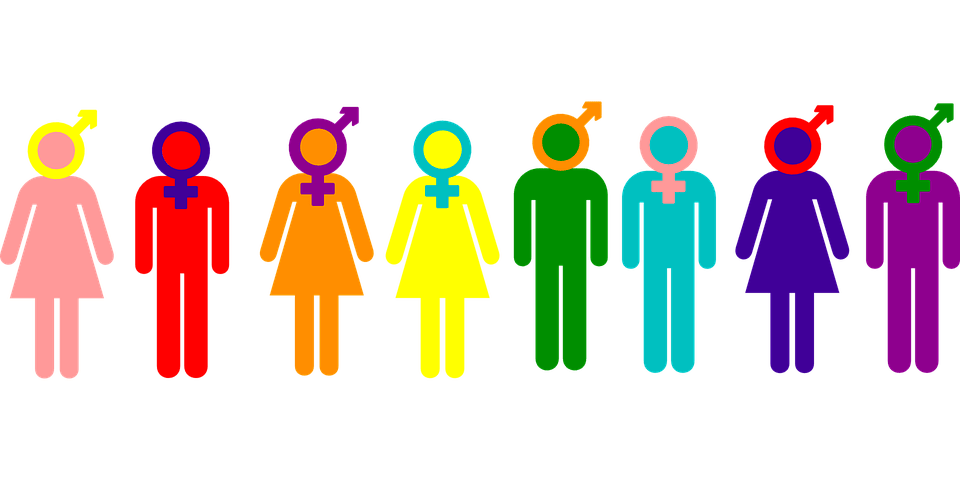By Fabricio Pupo*
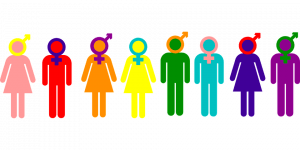
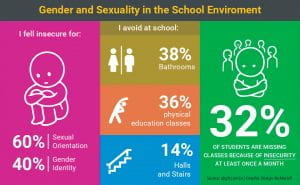
Gender and sexuality issues are not often discussed, especially in the school environment. The reasons are innumerable, and they have been historically considered controlled themes. In Brazil, the data relating to violence and prejudice are alarming and refer to the discussion of institutional security, especially within environments that are more closely linked to these young people such as school. This statement is verified when analyzing the 2016 data from the Brazilian Association of Lesbians, Gays, Bisexuals, Transsexuals (ABGLT) on dissenting gender and sexuality youth in the school environment, of which 60.2% of young people feel insecure in their educational institution due to their sexual orientation and 42.8% for the way they express their gender.
Prejudice in the face of experiences outside heteronormativity can silence young people and teachers in the school setting. School is often an arsenal that regulates not only sexuality but also gender.
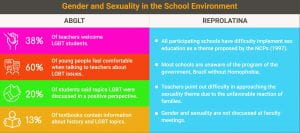
Silence in the face of the theme and oppression in relation to teaching work
The discourse that school, gender, and sexuality must constitute separate instances has been gaining strength. Reactions such as the Escola Sem Partido Program have motivated the persecution of teachers on charges of political and ideological indoctrination. It emerged in 2004, through the initiative of the attorney of the State of São Paulo, Miguel Nagib, and it has a threatening effect on teachers across the country. It seeks to criminalize teaching work around themes such as gender and sexuality. It is no coincidence that gender and sexuality are part of the themes that the defenders of this initiative point out as being the most permeable to ideological indoctrination since the persecution of these themes constituted an alignment with the agendas of the religious group representing a part of the population that supports moral precepts linked to the extreme right and Christianity.
The need for teaching work in this theme is corroborated by the National Curriculum Parameters (NCPs), they place these themes as transversal and relevant for discussion in educational establishments as well as for the pedagogical intervention process. NCPs are guidelines developed by the Federal Government that guide education in Brazil. They are separated by discipline and adopted by the public and private schools.
The school is a space where it is possible to observe the emergence of the visibility of dissenting gender and sexuality as well as conflicts over these experiences that seek to affirm forms of life hitherto subjugated. However, there are also positive experiences regarding the valuation of gender and sexuality differences at school.
Therefore, the interest in analyzing such experiences evaluated as positive by young people and teachers in the state of Mato Grosso do Sul in the central-west region of Brazil. The intention was to prioritize the reports that were evaluated by the participants as positive to better understand how they resist a prejudiced reality, which allowed a reflection not only on gender and sexuality but also on the agency of the participants concerning this theme in school institutions of different contexts.
Youth Experiences
School is a very important space for socialization, and it is part of the teacher’s job to ensure this interaction by attending to all representations. The young 20-year-old Sofia, from a private school pointing out something positive affirmed that “the teachers discuss and work on these themes in the classroom”. That corroborates the importance of making the discussion about gender and sexuality common every day.
Aurora, 19 years old, from a private school, in turn, says that she lived “an assumed relationship with a colleague at school”, which points out that, in addition to possible environments for discussion on this topic, the school also makes it a possible experience. The homosexual relationship is seen as different and the school acts positively on this issue when it allows the relationship to be seen.
In terms of school dropout, trans experiences seem to be the ones that stand out the most. For this reason, José Francisco, 25 years old, from a private school, reported: “At school, in high school, I was able to use the bathroom of the kind in which I identify myself. All of this was important, as school avoidance is avoided and dysphoria is reduced, enabling a better use of studies, which was my case”.
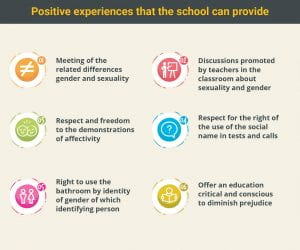
In their school experience, as well as that of many young people, the fact that they can use the bathroom according to their gender identity is the validation of the school’s acceptance of this difference. Another important acceptance reference cited by José Francisco is the social name and the comfort it can generate. According to him, “My positive experience at school took place in some ways … with the social name respected by all employees, teachers and coordinators. The name was on lists, in the closet, in the call and the like”. We can understand what the use of the social name and the bathroom might represent, when we are faced with indexes related to the violence suffered by the trans population. According to the National Association of Transvestites and Transsexuals – ANTRA, in Brazil, 90% of transgender people depend on prostitution to survive.
Teacher’s Experiences
The school is an important space for socialization and discussion, the teacher has a fundamental role in this mediation. In this sense, Rafael, 35 years old, from a private school, informs that the first posture he has is to verify how young dissidents of gender and sexuality are treated by colleagues, then he has a welcoming attitude: “When I notice some isolation and others signs of suffering I try to talk to the person and ask for permission to speak with the coordination and psychologists “. When recognizing the difference in the school environment a teacher meets his daily challenges and at that moment his or her attitude may or may not collaborate with freedom and the recognition of different representations of gender and sexuality within this space.
It is not uncommon that when this theme appears it is linked to certain control efforts through great strategies of knowledge and power. Marcelo, 28, from a private school, positively does not directly refer to a threat: “I try to explain that this feeling for the same sex is normal”. However, he justifies in the sequence: “but I mention the importance of using condoms to prevent STDs”.
Here, it is not a question of questioning the importance of guidelines about the prevention of this type of infection/disease, still there is a risk of restricting the experience of sexuality to a certain threat. One way to avoid this type of approach is to bet on the pedagogical and curricular policy of identity and difference. Teachers who have participated in this research feel unprepared to put this policy into practice. Ana, 42 years old, from a public school, justified this lack of preparation due to the complexity of the theme, pointing to the effects that this might present: “If we are not well grounded we risk to reinforce what has been put in place for centuries”. However, she affirmed that she is interested in the theme and this makes her look for authors that can be helpful to her, but she does not believe that this can happen to all teachers. This scenario points to the urgency of actions that promote a fairer school and that above all, guarantees human rights, for example, the integration of Public Policies, mentioned in the NCPs for sexual orientation. However, the school, or at least part of the teaching staff, seems to be unaware of these policies which hinders practices and attitudes that can promote the resignification of the school space for young dissidents.
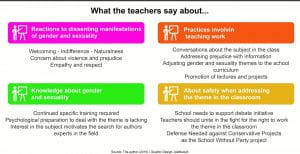
Toward a More Welcoming School
Young people’s experiences show us the importance of bringing the discussion about gender and sexuality to a daily practice within the school environment as we could realize how can the school be a possible place for the awareness of dissident experiences in terms of gender and sexuality. The evasion problem especially of transvestite and transsexual people appeared with the indication of the need to call people by the name that corresponds to their gender identity as well as the authorization for the use of the bathroom by that same self-assigned identity.
Teachers’ experiences value the welcoming attitude toward young dissidents of gender and sexuality which should be demarcated by the recognition of the difference in the school environment. The positive experience of dealing with these themes does not mean that they cannot be linked to speeches that may present them as a possible threat, as an example when dissident affective-sexual experiences are associated with diseases. Even so, some teachers are looking for more knowledge to approach the theme as they do not feel prepared to approach the theme from the perspective of the curricular policy of identity and difference.

Finally, even though the NCPs proposing to approach the theme in a transversal way, the legislation seems insufficient to guarantee in the curriculum the presence of the theme in the school as it should be taught. However, even so, the school presents itself as a possible place to resist attempts to criminalize teaching work around gender and sexuality. It is not a matter of minimizing the moral effects of the School without Party Program rather however young and teachers act independently of a “desire” in short they are involved in power relations, there are positive examples that seem to make the difference in terms of gender and sexuality, an experience that can be recognized at school.
*Fabricio Pupo Antunes is a 3rd-year high school student at Colégio Novaescola in Campo Grande – Mato Grosso do Sul, Brazil. He is a junior researcher in gender and sexuality, supervised by Prof. Dr. Tiago Duque at the Federal University of Mato Grosso do Sul, where he is also a member of Impróprias – Research Group about Gender, Sexuality and Differences (UFMS – CNPq). His research has been awarded in important scientific fairs, seminars, and academic congresses in Brazil and abroad with Regeneron ISEF, a finalist in the Behavioral Sciences area this year.
